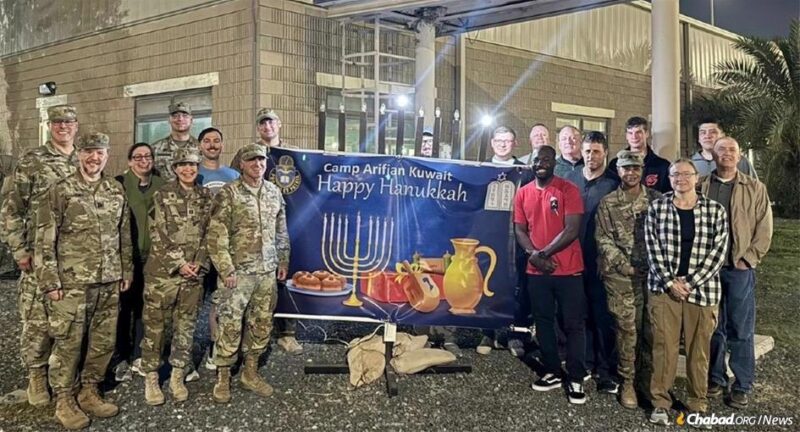
U.S. Troops in Kuwait Celebrate Chanukah
by Nancy K. S. Hochman – chabad.org
On a warm and dry December day in southern Kuwait, close to 40 soldiers, sailors and marines training at Camp Arifjan gathered to celebrate Chanukah. They lit menorahs, engaged in dreidel-spinning contests, savored home-fried potato latkes and sufganiyot (jelly doughnuts), and discussed how the story of Chanukah relates to their lives and needs in the military.
This year’s Chanukah celebration in Kuwait was led by U.S. Army Captain Elisar Admon, a chaplain endorsed by the Chabad-Lubavitch-affiliated Aleph Institute—the leading Jewish organization supporting Jewish soldiers in the United States and Canada. A native of Israel, Admon’s extensive resume includes his positions as an Israel Defense Forces soldier and rabbi and a certified mohel based in Richmond, Va. The rabbi also proudly notes that he’s an expert kosher chef who fried the latkes and sufganiyot himself.
When, more than a year ago, Admon learned from Aleph’s military personnel liaison Rabbi Elie Estrin of the possibility of a deployment to Kuwait for Chanukah, he immediately signed up to help raise the troops’ morale and bring the “Festival of Lights” and cheer to the men and women on the distant American military base.
Aleph, founded in 1981 at the direction of the Rebbe—Rabbi Menachem M. Schneerson, of righteous memory—provides financial, emotional and spiritual assistance to Jews serving in all branches of the U.S. military and to those in prisons throughout the United States, as well as their families.
Aleph-endorsed chaplains are hosting similar menorah lightings and Chanukah celebrations this year for troops in Japan, Germany, Bahrain, Iraq, South Korea, Romania and many major military bases in the U.S. And as part of the Chanukah program, Aleph has sent 686 menorahs and boxes of candles, and 926 dreidels and Chanukah chocolate bars to U.S. service members stationed around the world.
‘I’m Here for Them’
Admon says making Chanukah possible for soldiers is important both for them and for him.
“I grew up in an Israeli household that emphasized the value of sharing and caring,” he tells Chabad.org. “As a chaplain, I have the opportunity to bring G‑d to the soldiers and the soldiers to G‑d by performing chesed (‘kindness’): by listening to the soldiers and letting them know I’m here for them.”
At the Chanukah party, Admon briefly shared the story of Chanukah, instructed participants on how to light the menorah each was given and led them in reciting the prayers.
There’s also a large menorah on base that the troops will witness being lit on Thursday night, the last night of the eight-day holiday, says the rabbi.
Admon shared his belief that every soldier, regardless of their faith, has trust in G‑d, emphasizing the idea that “miracles happen to all of us. If G‑d made miracles in the past, He can make miracles now.”
The rabbi talked about the U.S. military’s vital mission fighting evil and trying to bring peace to the world. “We may need to jump into a fight, and we should know that G‑d truly does take care of us.”

Among the common topics Jewish soldiers raise throughout the year with Admon in his role as a U.S. army chaplain are how to observe Shabbat while away from family, the importance of prayer even without a minyan and how to keep kosher while in the field.
In recent years, Admon has worked with Aleph and other senior chaplains to increase awareness of kashrut and to make kosher food more available to troops on ships, bases and in the field.
While the number of Jewish soldiers en route to and from countries in the Middle East is increasing, making a weekly Shabbat minyan during their six-month-to-one-year-long deployment in Camp Arifjan in Kuwait can be challenging.
Nevertheless, several Jewish troops gather together each Friday morning to bake challah, and then convene to recite kiddush and share in the Shabbat meal on Friday evening. Throughout the week, troops engage the rabbi in discussions about the weekly Torah portion, life plans and relationships.

Addressing about a dozen soldiers who attended Kabbalat Shabbat services on the second night of Chanukah, Admon talked about Joseph and his brothers, who despite multiple travails were instrumental in G‑d’s plan to bring the Jewish people to Egypt, making it possible for their descendants to receive the Torah, the blueprint for all humankind, at Sinai.
“The main message in the Torah portion we read during Chanukah, and of the holiday of Chanukah itself,” he told the troops, “is the importance of having a relationship with G‑d, and knowing that G‑d has the plan.”













